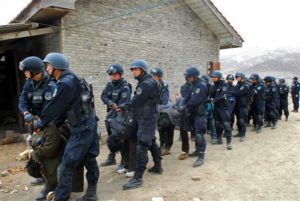
ALIBABA & CRONY CAPITALISM: CONFLATING STATE AND CORPORATE POWER
BLOG 2 OF 4 ON CHINA’S NEW REGIME OF REWARD AND PUNISHMENT
In China, big data already looms large. Jack Ma’s Alibaba does not face foreign competition, but he is not alone in the Chinese market. He knows, like all tech entrepreneurs, that he must at all times move disruptively fast if he is to stay ahead; and again it is the party-state that stands to benefit. Jack Ma now says his company’s future fortune depends on its embrace of big data. Knowing whether customer Gan Liping prefers her socks pink or purple is no longer enough. The data she generates each time she willingly signs on to generate more data is itself the product Jack Ma’s company sells, the socks are secondary. The best of customers for big data is the state; it is the reason the state exists, to implement party policy through a capacity to enforce, coax, cajole, incentivise and punish, to ensure everyone is sincere.
As the Financial Times explains: “If data are the new oil, Jack Ma, former English teacher turned China’s richest man, is the new John D Rockefeller. Like Rockefeller’s Standard Oil, Mr Ma’s Alibaba is a lucrative and rapidly growing business. Earlier this month, it forecast annual revenues would increase 45 to 49 per cent, adding $42.25bn to its value — almost an entire Barclays bank — the following day. “Alibaba is evolving into a big data conglomerate,” enthused Jessie Guo, analyst at Jefferies. “We are at the beginning of data-driven monetisation”, added Chi Tsang, head of internet research at HSBC. Alibaba’s vertically and horizontally integrated services span shopping, movies, finance and logistics, all collecting information on people’s spending, location and viewing. Once refined, the data are fed back to merchants, who in turn can better target their goods and sell more over Alibaba’s ecommerce platforms. Alibaba has also taken its data engine to new levels. It was buying physical stores well before Amazon set its sights on Whole Foods and is collating data on people’s habits in both the online and physical world, enabling more relevant store layout and more efficient management of inventory. It is also targeting far more products than its US peers. Alibaba’s competitors, mainly peers Baidu and Tencent, which together make up China’s BAT tech trinity, are building similarly massive databanks. Tencent’s WeChat social media platform has almost 940m subscribers, while Baidu collates information from owning the country’s leading search engine. The BAT tech giants — Baidu, Alibaba and Tencent — are in the midst of a data land grab, trying to draw lines around as much client information as possible. The stakes are high. Whoever commands the bulk of data from China’s 730m internet users will be able to dominate the online advertising and ecommerce markets, which collectively generated $930bn in revenue in 2016. “Alibaba in particular is becoming predatory and will knock off smaller players if they don’t adhere to what they want,” says Shaun Rein, founder of consultancy China Market Research Group. “Data are the next big fight.” Big data are also the fuel that powers artificial intelligence, which has applications in everything from driverless cars to home devices, and is generally touted as the next big thing in business. Baidu and Tencent have both set up AI labs in the US and China.”[1]
The state can use any amount of big data, and willingly invest in the technologies of surveillance that generate data fed through to “convenience” police stations, a new innovation in unhappy areas such as Tibet and Xinjiang, conveniently close to where people live, conveniently ready to enforce mandatory sincerity and trustworthiness. Data flows to grid management offices designed to break urban communities into atomised segments small enough for the grid captain and his chengguan community police to know everyone, and be able to pick out the untrustworthy at once, the moment technologies of surveillance pick up anything that looks noncompliant.
For a strong state with a Confucian urge to get stronger, to become a model tutelary state raising the human capital of all citizens, this data bonanza opens the door to the fulfilment of the Confucian dream of correcting the behaviour of each and every citizen, each and every time they fail to display correct sincerity and trustworthiness.
All that is needed is more technology, to capture behavioural compliance everywhere outside the home. When eventually the promised internet of things arrives, with every refrigerator, toaster and microwave monitoring and reporting our domestic behaviours as well, surveillance, rewards and punishments will be not only 24/7 but all-pervasive, and automated.
TIBET PIONEERS THE NEW PANOPTICON
These technologies of surveillance and data accumulation, now being rolled out across China, were pioneered in Tibet, and now even more intensively, in Xinjiang. New technologies promise to be more comprehensive, seeing everything, missing nothing, thus more effective than the old dang’an dossier on paper compiled by the party committee in every organisation.[2] Just as punishment of the untrustworthy is essential to seducing the compliant and trustworthy, so the technologies of always-on behavioural monitoring are essential to the obsession with big data. Tibet has led the way, now all of China follows.
In the West, there is a widespread perception that “the Tibet issue” is dead. Tibet’s moment has come and gone; the world has moved on, is now preoccupied with urgent issues closer to home, and no longer has the luxury of worrying about confusingly unclear claims to rights to self-determination, autonomy and religious freedom.
Tibetans see it differently. There is much more to “the Tibet issue” than collective and individual human rights. Tibet is China’s laboratory for a model of the meta-synthetic engineering of social compliance (to use China’s jargon) and for the technologies that enable its enforcement, that apply worldwide to all under heaven. The hubris of the systems theory wonks now in favour at the highest levels of the party-state is evident in their grandiose claims: “Along with the rapid development of China’s information network, an “Internet Chinese society” begins to take shape. How to conduct effective information collection, real-time analysis, fast and accurate large-scale dissemination and use, have become the major strategic issues connected to national security and competitiveness. Deployment in advance in those related technology issues, like Social Computing and Parallel Management Systems (PMS) is vital. Social Computing mainly makes use of open-source intelligence to do controllable and repeatable experiments on social issues, in order to achieve qualitative and quantitative assessment of the relevant decision-making plans and possible incidents. While Parallel Management Systems(PMS) makes use of the result of Social Computing to simulate and predict the occurrence and development process of real events, and form parallel artificial process, in order to achieve effective management and control of the events.”[3]
If the world fails to notice what is happening in laboratory Tibet, it too will find that the price of drawing ever closer to China is compulsory participation in the regime of endless behavioural proof of sincerity and trustworthiness.
Already, in Germany, think tanks advising German high tech companies doing business in China they need to be very careful: “The system will create strong incentives for companies to make their business decisions and operations comply not just with laws and regulations but also with the industrial and technological policy targets laid down by the Chinese government. Foreign companies active on the Chinese market are planned to be integrated into the system and treated the same way as their Chinese competitors. Foreign companies will also be subjected to the full extent of industrial policy guidance. At the heart of the Social Credit System lies massive data collection on company activities by government agencies and authorized rating entities. The system will be prone to failing technologies, data manipulation, and the politically induced, unidirectional allocation of investments. It will thus reduce the capacity for autonomous business decisions or non-standard disruptive business models and pose a constant risk to the protection of proprietary company data. Companies should take the accelerating implementation of the system and its impact on doing business in and with China very seriously.”[4]
Tibet leads China, and the world, as a testbed of not only technologies of surveillance and punishment, but also for slotting them into wider regimes of punishment and reward, which will appeal to all sovereign states worried about security risks within their borders. A primary tool for creating these wider regimes of compliance is linguistic. The scales which rank behaviour as compliant through to untrustworthy and insincere exist already in Tibetan language, as well as Chinese and English, and it is worth noting their similarities and differences as seemingly identical concepts slide between languages.
The concepts constituting the new regime are given attractive labels that make their use less objectionable and more palatable. Who could possibly be against sincerity and trustworthiness? Social credit sounds immediately like a good idea. In turn, these benign terms lend themselves to top-level design. It is only when they are observed in the field, in practice, that it becomes clear how they manifest in the daily lives of Tibetans stopped for ID checks every block, or for interrogations that invariably conclude with the demand for information on others that provides evidence of untrustworthy, insincere thoughts towards state power, expressed in private.
The lexicon of sincerity/honesty work, across three languages, reveals, especially in Tibetan, the fantasy of top-level systems design as the key to complete control. Tibetans are left in no doubt, in practice and in words, what is meant by the state’s fixation on stability maintenance and the sincerity work needed to ensure stability. Some of the key terms are actually mnemonic slogans, readily remembered because they are wrapped in vivid metaphors. Thanks to a recent trilingual decoding of these metaphors by Human Rights Watch, we can see afresh how the state’s sincerity work actually works.
First slogan is “Nets in the Sky, Traps on the Ground, in Tibetan: gnam rgya sa rnyi གནམ་རྒྱ་ས་རྙི།, in Chinese: tiānluó dìwǎng 天罗地网 Definition: This term refers to the pervasive systems of control and surveillance deployed to track, identify and capture criminals, dissidents, and fugitives. In the current Tibet context, it appears to refer to blocking foreign media broadcasts into Tibet, controlling cyberspace, and stopping Tibetans fleeing into exile or visiting India.”[5]

 There are more slogans familiar to Tibetans, as the governing metaphors of the state’s agenda to “forcefully carry forward a sincerity culture, accelerate the construction of personal sincerity records, complete incentive mechanisms for keeping trust and punitive mechanisms for breaking trust, ensure that trust keepers receive benefits and trust-breakers are subjected to restrictions”, to again quote recent State Council directives. Another slogan with deeply Chinese characteristics is “Copper Ramparts, Iron Walls, in Tibetan: zangs gyang lcags rtsigs ཟངས་གྱང་ལྕགས་རྩིགས།, in Chinese: tóngqiáng tiěbì 铜墙铁壁 Definition: The term refers to an impenetrable “public security defense network” (zhi’an lianfang wangluo) consisting of citizen patrols, border security posts, police checkposts, surveillance systems, internet controls, identity card monitoring, travel restrictions, management of “focus personnel,” grid unit offices, informant networks, and other mechanisms that aim to control or monitor movement of people and ideas into, out of, or within a region or society.”
There are more slogans familiar to Tibetans, as the governing metaphors of the state’s agenda to “forcefully carry forward a sincerity culture, accelerate the construction of personal sincerity records, complete incentive mechanisms for keeping trust and punitive mechanisms for breaking trust, ensure that trust keepers receive benefits and trust-breakers are subjected to restrictions”, to again quote recent State Council directives. Another slogan with deeply Chinese characteristics is “Copper Ramparts, Iron Walls, in Tibetan: zangs gyang lcags rtsigs ཟངས་གྱང་ལྕགས་རྩིགས།, in Chinese: tóngqiáng tiěbì 铜墙铁壁 Definition: The term refers to an impenetrable “public security defense network” (zhi’an lianfang wangluo) consisting of citizen patrols, border security posts, police checkposts, surveillance systems, internet controls, identity card monitoring, travel restrictions, management of “focus personnel,” grid unit offices, informant networks, and other mechanisms that aim to control or monitor movement of people and ideas into, out of, or within a region or society.”
A seemingly neutral term focuses the gaze of the state on those most likely to be in a deficit of social credit: “Key Persons, in Tibetan: gtso gnad mi sna གཙོ་གནད་མི་སྣ།, in Chinese: zhòngdiǎn rényuán kòngzhì 重点人员 Definition: The full version of this phrase in Chinese means “important persons to be controlled.”This refers to individuals deemed to pose a potential threat to society, so that officials and police should monitor or “control” their movements and behavior especially closely; similar to profiling. A 2012 list in Tibet included, (1) those released from detention; (2) those returning from abroad (huiliu renyuan), such as Tibetans who have been unofficially to India; (3) “mobile” monks and nuns, meaning those who are not officially affiliated to and residing in a monastery; (4) people who were monks or nuns in the past but have been expelled from a monastery; (5) people suspected of involvement in the protests of March 2008; and (6) “other individuals who require special attention.”
Another official slogan is: “Every Village a Fortress, Everyone a Watchman, in Tibetan: grong tsho tshang ma mkhar rdzong dang mi tshang ma so dmag གྲོང་ཚོ་ཚང་མ་མཁར་རྫོང་དང་མི་ཚང་མ་སོ་དམག, in Chinese: cūn cūn chéng bǎolěi, rén rén zuò shǒuwàng 村村成堡垒,人人做守望 Definition: Requiring every community and every resident in Tibet to be active participants in “stability maintenance” work, meaning that all residents must report any threats to stability, such as the arrival of outsiders or expressions of dissent, and must participate actively in security operations. These operations include “voluntary defense teams,” “patrol teams,” and other security measures in villages, local communities, workplaces, and schools. Participation is unlikely to be optional. The phrase also describes the ideal “stability maintenance” condition, where every community is so well policed by the residents that no disturbing ideas or people can enter it undetected.”
Another common slogan expresses the state’s need for all behaviours to be made visible to official scrutiny: “Eliminate Unseen Threats, in Tibetan: mi mngon pa’i rkyen ngan med pa bzo ba མི་མངོན་པའི་རྐྱེན་ངན་མེད་པ་བཟོ་བ།, in Chinese: xiāochú yǐnhuàn 消除隐患 Definition: An overarching instruction for all “stability maintenance” work, requiring personnel to take preemptive action against any potential cause of instability, even if it does not yet appear to be a threat. This instruction refers to the belief among Chinese officials that even an apparently minor issue or complaint can trigger underlying disaffection among the general population and lead to serious protests against the state, especially in Tibet.”
Yet another slogan, to be memorised by police empowered to do official honesty/sincerity work conveys the same fixation on making the citizenry legible to the state: “No Cracks, No Shadows, No Gaps Left, in Tibetan: srubs kha | grib cha | stong cha bcas ma lus pa སྲུབས་ཁ། གྲིབ་ཆ། སྟོང་ཆ་མ་ལུས་པ།, in Chinese: meiyou fèngxì, meiyou mángdiǎn hé meiyou kòngbái dian 没有缝子,没有盲点和没有空白点 Definition: The Chinese version of this slogan can be translated literally as “no cracks, no blind spots, no gaps unfilled.” It is an order or “guiding instruction” to police, Party officials, and others not to overlook or neglect even the most trivial location or aspect of a case when they are assessing, investigating or searching a village, home, monastery, or any other location. It instructs them to investigate a person even when there is only the slightest suspicion that they might pose a potential threat to “stability maintenance.” This instruction is repeated frequently to local officials in the TAR, ordering them to surveil all people who appear to present the slightest threat.”
These are key phrases for doing honesty/sincerity work on the ground. What do they add up to? Sincerity work and social credit rankings are comparatively new concepts, born as the era of big data dawns. Before this new top-level design to monitor, punish and correct insincerity and trust-breaking, there was already a lexicon, still common in Tibet, more euphemistic, defining the overall purpose of surveillance, reward and punishment of Tibetans. The most widely known key term is stability maintenance, in use for many years, a command from the highest levels of the party-state to the lowest of local government officials to contain dissent at all costs, prevent protest from spreading, by holding local officials ineligible for promotion if they fail.
[1] Louise Lucas, Alibaba taps user data to drive growth spurt, Financial Times, 22 June 2017 https://www.ft.com/content/cca7f5ea-5567-11e7-80b6-9bfa4c1f83d2
[2] William W. Moss, Dang’an: Contemporary Chinese Archives, The China Quarterly, No. 145 (Mar., 1996), pp. 112-129
[3] Twenty-two S&T Initiatives of Strategic Importance to China’s Modernization, Science & Technology in China: A Roadmap to 2050: Strategic General Report of the Chinese Academy of Sciences, Ed: Yongxiang L, Springer 2010
[4] Mirjam Meissner, CHINA’S SOCIAL CREDIT SYSTEM: A big-data enabled approach to market regulation with broad implications for doing business in China, Mercator Institute for China Studies, Berlin, May 2017, www.merics.org
[5] Human Rights Watch, Tibet: A glossary of repression, 19 June 2017
https://www.hrw.org/news/2017/06/19/china-tibet-propaganda-masks-repression
https://www.hrw.org/video-photos/interactive/2017/05/26/tibet-glossary-repression




